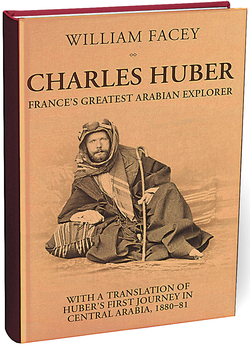 Huber (1847–84) tends to be overlooked in the pantheon of great European explorers of Arabia. Several reasons help account for this obscurity: he wrote in French, a minor language of this topic; indiscretions in his youth; a lone-wolf character; being murdered aged 36 limited his output; and because his dry style of cataloging meant, in the words of Christian Julien Robin, that he "sought recognition above all else as a leading geographer and explorer among his fellow-professionals, and had no ambitions for literary success or public admiration." Nonetheless, as his biographer, the historian Facey, shows, Huber deserves to be remembered for the documentary contributions made during his two Arabian journeys between 1880 and 1884.
Huber (1847–84) tends to be overlooked in the pantheon of great European explorers of Arabia. Several reasons help account for this obscurity: he wrote in French, a minor language of this topic; indiscretions in his youth; a lone-wolf character; being murdered aged 36 limited his output; and because his dry style of cataloging meant, in the words of Christian Julien Robin, that he "sought recognition above all else as a leading geographer and explorer among his fellow-professionals, and had no ambitions for literary success or public admiration." Nonetheless, as his biographer, the historian Facey, shows, Huber deserves to be remembered for the documentary contributions made during his two Arabian journeys between 1880 and 1884.
Huber's primary interest, Facey explains, lay in "mapping a region of which Europe had almost no geographical conception." Although he had uneven relations with the French government and fellow explorers, his "explorations and the scientific data he collected were recognized immediately by the French geographical establishment as a major contribution to knowledge." He managed this despite hostile relations with his main European partner, the German Julius Euting, for Huber "was possessed to an extreme degree by classic 'explorer's syndrome': the ambition of the pioneer in unknown lands to claim 'firsts' for himself."
Facey's work represents a model of academic thoroughness, with its many footnotes, appendices, and contributions by other scholars. My favorite of his accomplishments must be turning Huber's eccentric transcriptions into something recognizable and pronounceable; thus does the other-worldly El-Uscevuasce become the much simpler al-Washwāsh. How refreshing to discover such genuine erudition in an age that prefers to reward superficiality.